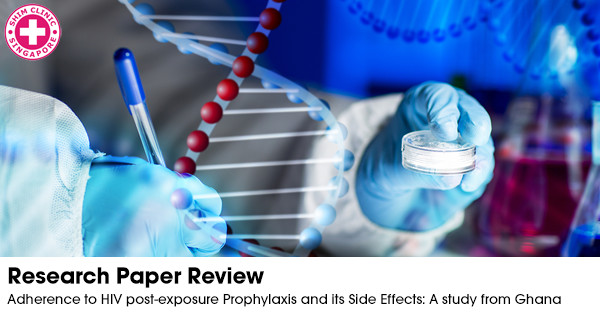HIV holds a great threat to health care workers as constant exposure may lead to accidental HIV infection in previously un-infected individuals. A timely treatment of HIV Post-exposure Prophylaxis (PEP) is a prevention therapy that has been proven to be highly effective in protecting against occupational HIV infection. Due to its potential toxicities though, a substantial amount of people on PEP discontinue treatment. A study published in the BMC Public Health, in June 2015, reported the correlation of the adverse effects of PEP and the adherence to it. The study was conducted amount Health care Workers and Health care Students from the Korle-Bu Teaching Hospital, Ghana.
The cohort study was conducted on healthcare providers who were started with PEP due to HIV exposure from January 2005 till December 2010. A total of 228 exposed health care providers were included in the study. The risk assessment was done according to a preset in-house risk assessment system and with help with the guidelines set by the CDC. The medication was prescribed according to the risk exposure. The combination of lamuvidine/ziduvidine/lopinavir-ritonavir or lamuvidine/ziduvidine was administered in high-risk patients for 28 days. People with medium to low risk were given lamuvidine/ziduvidine for either 28 days or only for 3 days. The patients were followed up with blood analysis at week 6, month 3 and month 6 to check for sero-conversion.
Records of incidences of adverse reactions and adherence levels was maintained through telephone contact on day 3 and day 10 for the people who were prescribed the 3-day regimen. For people who were given a 28-day therapy, follow-ups were performed on day 3, day 10, day 20, day 28 and day 35 after the drug was dispensed.
Adverse reactions information related to the PEP treatment were collected from the participants with the help of a questionnaire. The adherence to the medication was assessed during the follow-up visit also with the help of a questionnaire.
The results were interesting to note as they showed that a total of 51% of the participants who received lamuvidine/ziduvidine for 3 days has a follow-up attendance of almost 65% compared to 90% attendance for those on the 28-day regimen. 52 out of 53 people who were receiving the three-drug medication of lamuvidine/ziduvidine/opinavir-ritonavir followed up. 16 people discontinued their two-drug PEP of lamuvidine/ziduvidine when they were found to be seronegative. Interestingly more than 80% of people reported that the time of their HIV exposure was less than 24 hours.
The highest adverse effects were reported to be with the three drugs PEP for 28 days followed by the two-drug PEP for 28 days. The least side effects were reported to be with lamuvidine/ziduvidine 3-day therapy. The most commonly reported side effect was nausea.
100% adherence to PEP was found with the 3-day lamuvidine/ziduvidine treatment. A significant decrease in adherence was noticed with the lamuvidine/ziduvidine treatment on the 28-day regimen (56 %) and the lamuvidine/ziduvidine/lopinavir-ritonavir combo treatment on the 28-day regimen (62%).
Source:
Tetteh R. A. et al. Adverse events and adherence to HIV post-exposure prophylaxis: a cohort study at the Korle-Bu teaching hospital in Accra, Ghana. BMC Public Health, 2015.

